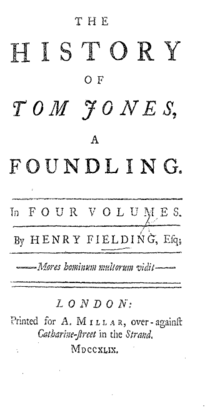
 After Allworthy pronounced his will in the reading from last week, we focused on everyone else in the house—and ignored Tom. Fielding now turns to focus on him. Tom doesn’t deal well with his guardian’s impending death—not that anyone else did, but Tom’s focused on Allworthy himself, not what he’s being left.
After Allworthy pronounced his will in the reading from last week, we focused on everyone else in the house—and ignored Tom. Fielding now turns to focus on him. Tom doesn’t deal well with his guardian’s impending death—not that anyone else did, but Tom’s focused on Allworthy himself, not what he’s being left.
In the aftermath both of Blifil’s tragic news and Allworthy’s recovery, Tom and Thwackum bicker a bit and then Blifil and Tom get into a scuffle as well—tempers are short (and alcohol-fueled), but peace eventually prevails. Tom heads outside to cool down and turns his thoughts to Sophie—but he sees Molly doing some fieldwork (I don’t think Fielding specified, but she has a pitch-fork). The two chat a bit, and then head off into the bushes for some privacy.
Thwackum and Blifil have a similar idea—they’re taking a walk to get over the fights. Naturally, they see those two heading for the bushes. Blifil recognizes both of them, but Thwackum only sees a couple of people up to something. He heads off to try to stop the illicit behavior, and Blifil doesn’t do anything to stop him. The two make enough of a racket that the lovers know they’re coming.
Molly has gone into hiding and Tom goes to confront the interlopers and to keep them from discovering who the young woman was (which seems their primary concern). The fists start flying—and it’s kind of an amusing fight scene at the beginning. But the still recovering Tom starts to succumb to the numbers when he’s joined in the fight. A passerby is offended by the idea that two would fight one and jumps in to even the odds without wondering who the one is, much less the two.
It turns out that it’s Squire Western who’d joined the fray and he’s more than enough to turn the tide.
At this Time, the following was the Aspect of the bloody Field. In one Place lay on the Ground, all pale, and almost breathless, the vanquished Blifil. Near him stood the Conqueror Jones, almost covered with Blood, part of which was naturally his own, and part had been lately the Property of the Reverend Mr. Thwackum. In a third Place stood the said Thwackum, like King Porus, sullenly submitting to the Conqueror. The last Figure in the Piece was Western the Great, most gloriously forbearing the vanquished Foe.
Before Western came to Tom’s rescue, he’d been out for a walk with his wife and Sophie—who come upon that scene. Seeing Tom covered in blood is too much for Sophie, who faints dead away—until Tom revives her. Tom and the Westerns go their way and Blifil and Thwackum return to Allworthy’s and Book V comes to an end.
I’m honestly not sure what I think about this section—after the reading last week it looked liked things were starting to happen, but these chapters felt like a whole lot of tire spinning. Sure, it’s nice that things are getting a bit clearer between Blifil and Tom—and Tom and Sophie—it just felt like a little bit of a let-down (it also could’ve been that I had a hard time focusing). Still, the fight scene made it worthwhile.
I cheated a bit and read the first paragraph of Book VI, and I am looking forward to it, so there’s that…
![]()

